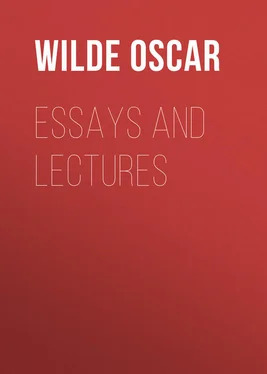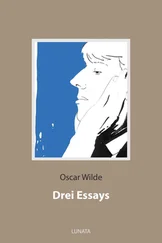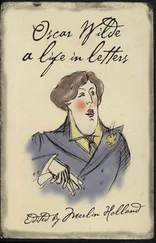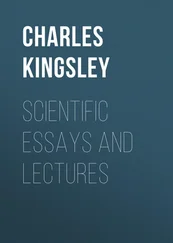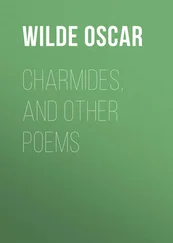Oscar Wilde - Essays and Lectures
Здесь есть возможность читать онлайн «Oscar Wilde - Essays and Lectures» — ознакомительный отрывок электронной книги совершенно бесплатно, а после прочтения отрывка купить полную версию. В некоторых случаях можно слушать аудио, скачать через торрент в формате fb2 и присутствует краткое содержание. Жанр: foreign_home, literature_19, foreign_prose, на английском языке. Описание произведения, (предисловие) а так же отзывы посетителей доступны на портале библиотеки ЛибКат.
- Название:Essays and Lectures
- Автор:
- Жанр:
- Год:неизвестен
- ISBN:нет данных
- Рейтинг книги:3 / 5. Голосов: 1
-
Избранное:Добавить в избранное
- Отзывы:
-
Ваша оценка:
- 60
- 1
- 2
- 3
- 4
- 5
Essays and Lectures: краткое содержание, описание и аннотация
Предлагаем к чтению аннотацию, описание, краткое содержание или предисловие (зависит от того, что написал сам автор книги «Essays and Lectures»). Если вы не нашли необходимую информацию о книге — напишите в комментариях, мы постараемся отыскать её.
Essays and Lectures — читать онлайн ознакомительный отрывок
Ниже представлен текст книги, разбитый по страницам. Система сохранения места последней прочитанной страницы, позволяет с удобством читать онлайн бесплатно книгу «Essays and Lectures», без необходимости каждый раз заново искать на чём Вы остановились. Поставьте закладку, и сможете в любой момент перейти на страницу, на которой закончили чтение.
Интервал:
Закладка:
Now, while the workings of historical criticism in these two spheres of sacred and uninspired history are essentially manifestations of the same spirit, yet their methods are so different, the canons of evidence so entirely separate, and the motives in each case so unconnected, that it will be necessary for a clear estimation of the progress of Greek thought, that we should consider these two questions entirely apart from one another. I shall then in both cases take the succession of writers in their chronological order as representing the rational order – not that the succession of time is always the succession of ideas, or that dialectics moves ever in the straight line in which Hegel conceives its advance. In Greek thought, as elsewhere, there are periods of stagnation and apparent retrogression, yet their intellectual development, not merely in the question of historical criticism, but in their art, their poetry and their philosophy, seems so essentially normal, so free from all disturbing external influences, so peculiarly rational, that in following in the footsteps of time we shall really be progressing in the order sanctioned by reason.
II
At an early period in their intellectual development the Greeks reached that critical point in the history of every civilised nation, when speculative invades the domain of revealed truth, when the spiritual ideas of the people can no longer be satisfied by the lower, material conceptions of their inspired writers, and when men find it impossible to pour the new wine of free thought into the old bottles of a narrow and a trammelling creed.
From their Aryan ancestors they had received the fatal legacy of a mythology stained with immoral and monstrous stories which strove to hide the rational order of nature in a chaos of miracles, and to mar by imputed wickedness the perfection of God’s nature – a very shirt of Nessos in which the Heracles of rationalism barely escaped annihilation. Now while undoubtedly the speculations of Thales, and the alluring analogies of law and order afforded by physical science, were most important forces in encouraging the rise of the spirit of scepticism, yet it was on its ethical side that the Greek mythology was chiefly open to attack.
It is difficult to shake the popular belief in miracles, but no man will admit sin and immorality as attributes of the Ideal he worships; so the first symptoms of a new order of thought are shown in the passionate outcries of Xenophanes and Heraclitos against the evil things said by Homer of the sons of God; and in the story told of Pythagoras, how that he saw tortured in Hell the ‘two founders of Greek theology,’ we can recognise the rise of the Aufklärung as clearly as we see the Reformation foreshadowed in the Inferno of Dante.
Any honest belief, then, in the plain truth of these stories soon succumbed before the destructive effects of the a priori ethical criticism of this school; but the orthodox party, as is its custom, found immediately a convenient shelter under the ægis of the doctrine of metaphors and concealed meanings.
To this allegorical school the tale of the fight around the walls of Troy was a mystery, behind which, as behind a veil, were hidden certain moral and physical truths. The contest between Athena and Ares was that eternal contest between rational thought and the brute force of ignorance; the arrows which rattled in the quiver of the ‘Far Darter’ were no longer the instruments of vengeance shot from the golden bow of the child of God, but the common rays of the sun, which was itself nothing but a mere inert mass of burning metal.
Modern investigation, with the ruthlessness of Philistine analysis, has ultimately brought Helen of Troy down to a symbol of the dawn. There were Philistines among the Greeks also who saw in the ἄναξ ἀδρῶν a mere metaphor for atmospheric power.
Now while this tendency to look for metaphors and hidden meanings must be ranked as one of the germs of historical criticism, yet it was essentially unscientific. Its inherent weakness is clearly pointed out by Plato, who showed that while this theory will no doubt explain many of the current legends, yet, if it is to be appealed to at all, it must be as a universal principle; a position he is by no means prepared to admit.
Like many other great principles it suffered from its disciples, and furnished its own refutation when the web of Penelope was analysed into a metaphor of the rules of formal logic, the warp representing the premises, and the woof the conclusion.
Rejecting, then, the allegorical interpretation of the sacred writings as an essentially dangerous method, proving either too much or too little, Plato himself returns to the earlier mode of attack, and re-writes history with a didactic purpose, laying down certain ethical canons of historical criticism. God is good; God is just; God is true; God is without the common passions of men. These are the tests to which we are to bring the stories of the Greek religion.
‘God predestines no men to ruin, nor sends destruction on innocent cities; He never walks the earth in strange disguise, nor has to mourn for the death of any well-beloved son. Away with the tears for Sarpedon, the lying dream sent to Agamemnon, and the story of the broken covenant!’ (Plato, Republic , Book ii. 380; iii. 388, 391.)
Similar ethical canons are applied to the accounts of the heroes of the days of old, and by the same a priori principles Achilles is rescued from the charges of avarice and insolence in a passage which may be recited as the earliest instance of that ‘whitewashing of great men,’ as it has been called, which is so popular in our own day, when Catiline and Clodius are represented as honest and far-seeing politicians, when eine edle und gute Natur is claimed for Tiberius, and Nero is rescued from his heritage of infamy as an accomplished dilettante whose moral aberrations are more than excused by his exquisite artistic sense and charming tenor voice.
But besides the allegorising principle of interpretation, and the ethical reconstruction of history, there was a third theory, which may be called the semi-historical, and which goes by the name of Euhemeros, though he was by no means the first to propound it.
Appealing to a fictitious monument which he declared that he had discovered in the island of Panchaia, and which purported to be a column erected by Zeus, and detailing the incidents of his reign on earth, this shallow thinker attempted to show that the gods and heroes of ancient Greece were ‘mere ordinary mortals, whose achievements had been a good deal exaggerated and misrepresented,’ and that the proper canon of historical criticism as regards the treatment of myths was to rationalise the incredible, and to present the plausible residuum as actual truth.
To him and his school, the centaurs, for instance, those mythical sons of the storm, strange links between the lives of men and animals, were merely some youths from the village of Nephele in Thessaly, distinguished for their sporting tastes; the ‘living harvest of panoplied knights,’ which sprang so mystically from the dragon’s teeth, a body of mercenary troops supported by the profits on a successful speculation in ivory; and Actæon, an ordinary master of hounds, who, living before the days of subscription, was eaten out of house and home by the expenses of his kennel.
Now, that under the glamour of myth and legend some substratum of historical fact may lie, is a proposition rendered extremely probable by the modern investigations into the workings of the mythopœic spirit in post-Christian times. Charlemagne and Roland, St. Francis and William Tell, are none the less real personages because their histories are filled with much that is fictitious and incredible, but in all cases what is essentially necessary is some external corroboration, such as is afforded by the mention of Roland and Roncesvalles in the chronicles of England, or (in the sphere of Greek legend) by the excavations of Hissarlik. But to rob a mythical narrative of its kernel of supernatural elements, and to present the dry husk thus obtained as historical fact, is, as has been well said, to mistake entirely the true method of investigation and to identify plausibility with truth.
Читать дальшеИнтервал:
Закладка:
Похожие книги на «Essays and Lectures»
Представляем Вашему вниманию похожие книги на «Essays and Lectures» списком для выбора. Мы отобрали схожую по названию и смыслу литературу в надежде предоставить читателям больше вариантов отыскать новые, интересные, ещё непрочитанные произведения.
Обсуждение, отзывы о книге «Essays and Lectures» и просто собственные мнения читателей. Оставьте ваши комментарии, напишите, что Вы думаете о произведении, его смысле или главных героях. Укажите что конкретно понравилось, а что нет, и почему Вы так считаете.
